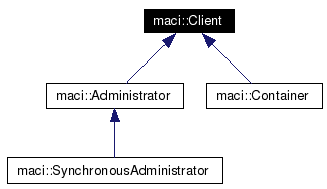
import "maci.idl";
Inheritance diagram for maci::Client:

Public Member Functions | |
| oneway void | disconnect () |
| AuthenticationData | authenticate (in ExecutionId execution_id, in string question) |
| oneway void | message (in short type, in string message) |
| oneway void | taggedmessage (in short type, in short messageID, in string message) |
| boolean | ping () |
| oneway void | components_available (in ComponentInfoSeq components) |
| oneway void | components_unavailable (in stringSeq component_names) |
Public Attributes | |
| const short | MSG_ERROR = 0 |
| const short | MSG_INFORMATION = 20 |
| const short | MSGID_AUTOLOAD_START = 1 |
| const short | MSGID_AUTOLOAD_END = 2 |
| readonly attribute string | name |
|
||||||||||||
|
Authentication method. Method authenticate is the challenge issued to the client after it tries to login. The login will be successful if the client's authenticate() produces the expected result. Only in this case will the Manager's login method return a valid handle, which the client will later use as the id parameter with all calls to the Manager.
|
|
|
Notify client about the change (availability) of the components currently in use by this client. For administrative clients, notification is issued for the change of availability of any component in the domain. Notice that this is a oneway method and therefore there cannot be return values or user exceptions. Only CORBA runtime exceptions due to communication issues can be thrown
|
|
|
Notify client that some of the components currently in use by client have become unavailable. Notice that this is a oneway method and therefore there cannot be return values or user exceptions. Only CORBA runtime exceptions due to communication issues can be thrown
|
|
|
Disconnect notification. The disconnect method is called by the Manager to notify the client that it will be unavailable and that the client should log off. Notice that this is a oneway method and therefore there cannot be return values or user exceptions. Only CORBA runtime exceptions due to communication issues can be thrown |
|
||||||||||||
|
The Manager and administrators use this method for sending textual messages to the client. Notice that this is a oneway method and therefore there cannot be return values or user exceptions. Only CORBA runtime exceptions due to communication issues can be thrown
|
|
|
Manager pings its clients (both GUI clients, as well as containers) repeatedly to verify that they still exist. The return value can be either "true", indicating that everything is OK with the client, of "false", indicating that client is malfunctioning. If CORBA::TRANSIENT exception is thrown, the Manager should retry the ping several times, and only then shall the client be assumed to be malfunctioning. If another exception is thrown, the client may be immediately assumed to be malfunctioning. Once the client is found to be malfunctioning, the Manager makes an implicit logout of the client. |
|
||||||||||||||||
|
The Manager and administrators use this method for sending textual messages and status indicators to the client. Notice that this is a oneway method and therefore there cannot be return values or user exceptions. Only CORBA runtime exceptions due to communication issues can be thrown
|
|
|
Type constant identifying an error message. |
|
|
Type constant identifying informational message. |
|
|
Type constant identifying component autoload end message |
|
|
Type constant identifying component autoload start message |
|
|
Client name |
 1.3.8
1.3.8